AI Integration in Business: A Practical Guide
June 21, 2024 • 849 Views • 15 min read
Tetiana Stoyko
CTO & Co-Founder
AI integration is a new trend in the IT industry.
The emergence of various open-source AI solutions, such as ChatGPT and MidJourney, sparked a revolution in artificial intelligence, demonstrating the capabilities of these tools and the potential of AI integration in business.
Modern users already have advanced experience in working with various AI tools.
Besides unlimited access to open-source AI models like chatbots, many businesses can use a custom software development service to tailor and personalize their artificial intelligence software.
As a result, AI has gone from an advanced, futuristic technology in books to a new, everyday reality in less than 2 years.
Still, many business owners hesitate and are unsure about integrating AI into their operations.
The best way to make the right decision is to analyze a few examples of AI integration in business and the challenges these technologies pose today.
Understanding AI Integration in Business
Let’s start with the basics.
Ask yourself: What do you know about Artificial Intelligence and Machine Learning?
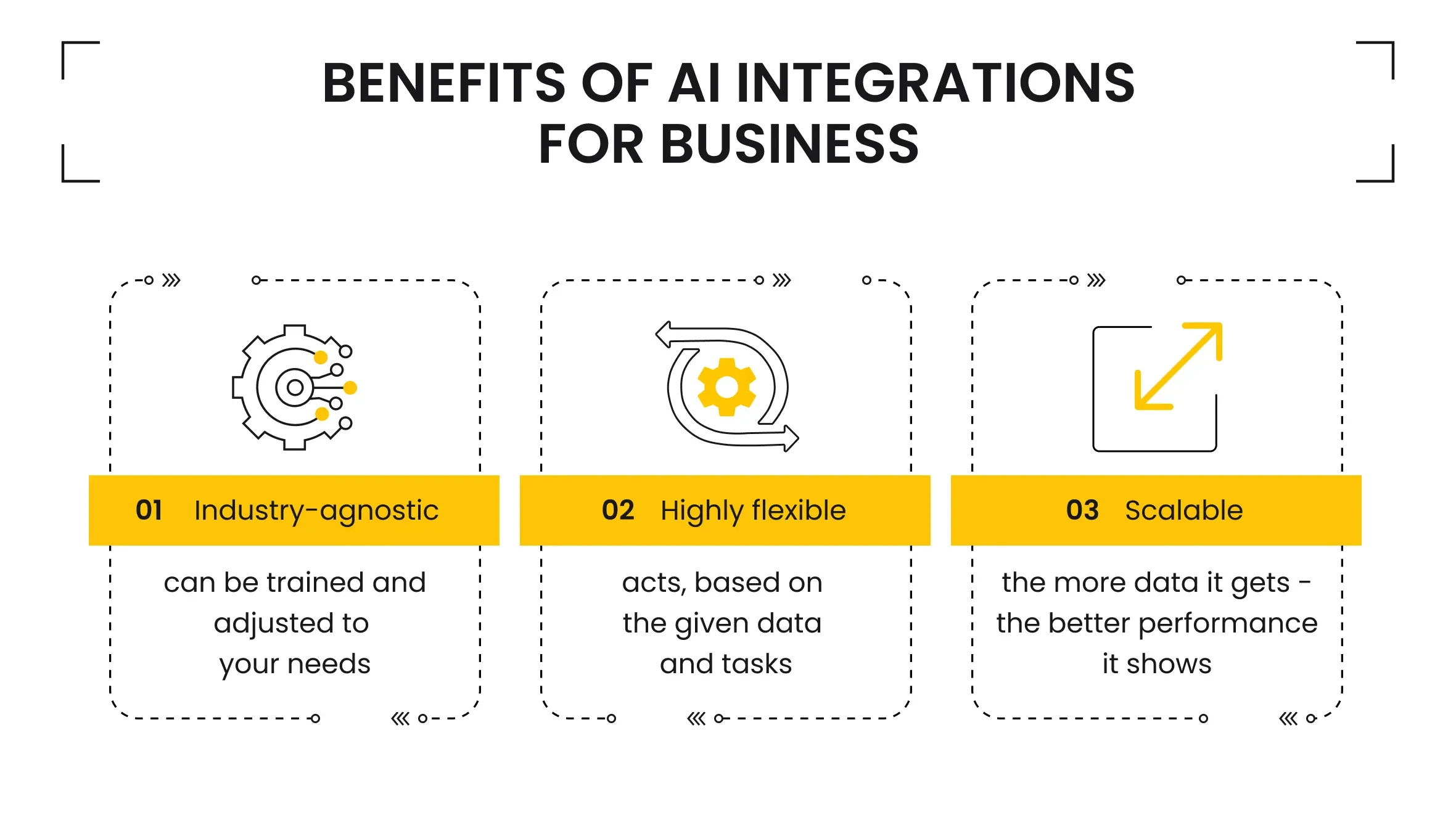
Long story short, Artificial intelligence is a complex software solution, designed to identify patterns and various correlations.
Based on this feature, AI is capable of learning new information and taking its own actions to succeed and achieve specific goals.
The process of AI training and learning is called Machine Learning.
Implementing artificial intelligence enables the automation of various tasks by allowing AI to make decisions independently.
One of the most important advantages of any AI integration - is flexibility.
Most AI business solutions are industry-agnostic: they can be trained to perform any task.
So, the only limitation, related to AI efficiency, is its training and access to the requested data.
Thus, during AI adoption in business, remember a simple rule: the more data AI has, the better the results it shows.
Frankly, providing AI models with sufficient data is one of the most challenging tasks in machine learning or such integrations.
Why You Need AI Integration in Your Business?
Before answering how to integrate AI into your business, we also have to discuss AI business opportunities available today.
Artificial intelligence integration is a great way to improve and automate numerous business processes.
Starting with business analysis and better customer experience, and ending with using AI to enhance business operations, which require time and are resource-intensive.
One of the most challenging steps of integrating AI in business is to define the goals you want to achieve and find AI solutions that can help you to achieve them.
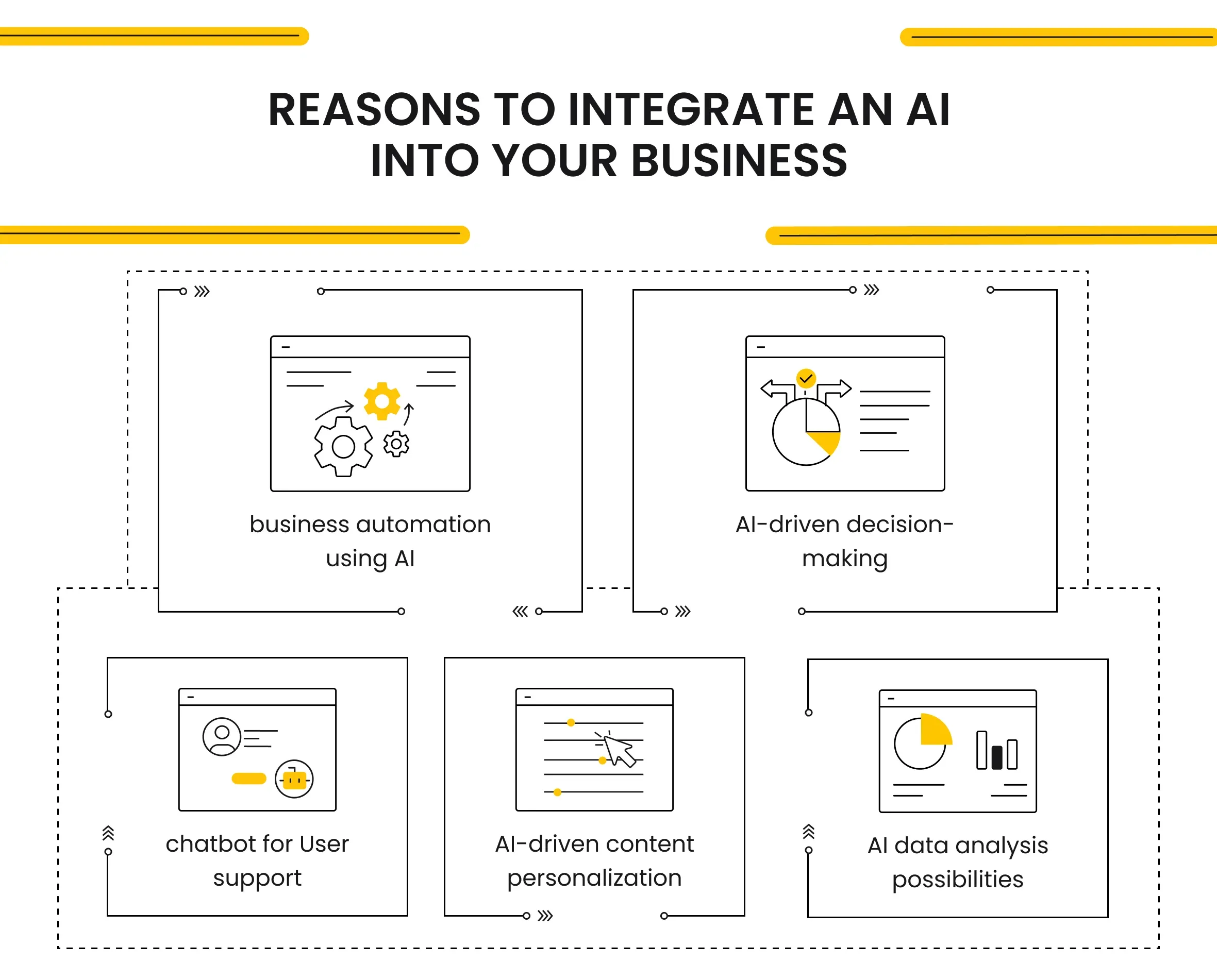
For instance, many examples of artificial intelligence in business are designed to achieve content personalization and create a seamless customer experience while using business services or software.
The main ways of using artificial intelligence technologies in business today:
- Artificial intelligence in business analytics. This is especially valuable when dealing with big data: it facilitates data mining and analysis.
- AI for business automation helps streamline repetitive and routine tasks and redirect resources to more prioritized tasks.
- Artificial intelligence for customer experience. It is an easy task, possible to embody by integrating even a single AI solution, trained to boost customer service.
- AI for business growth and decision-making. Linking your artificial intelligence to databases enables you to forecast market changes, improve risk assessment, and detect fraud, among other things.
Nevertheless, the abovementioned is not the final list of possible advantages and benefits of AI adoption in business.
Still, the only evident reason for using AI to enhance business operations is that it works.
How to Get Started with AI Integration
When you think about such software changes, you need an AI integration strategy.
Numerous AI-driven tools can be integrated into your business to perform various tasks.
However, before you implement AI in business, you must define which artificial intelligence integration will benefit you the most.
1. Identify Your Needs and Goals
The first and most crucial step before integrating AI into different operations is to define your needs and goals.
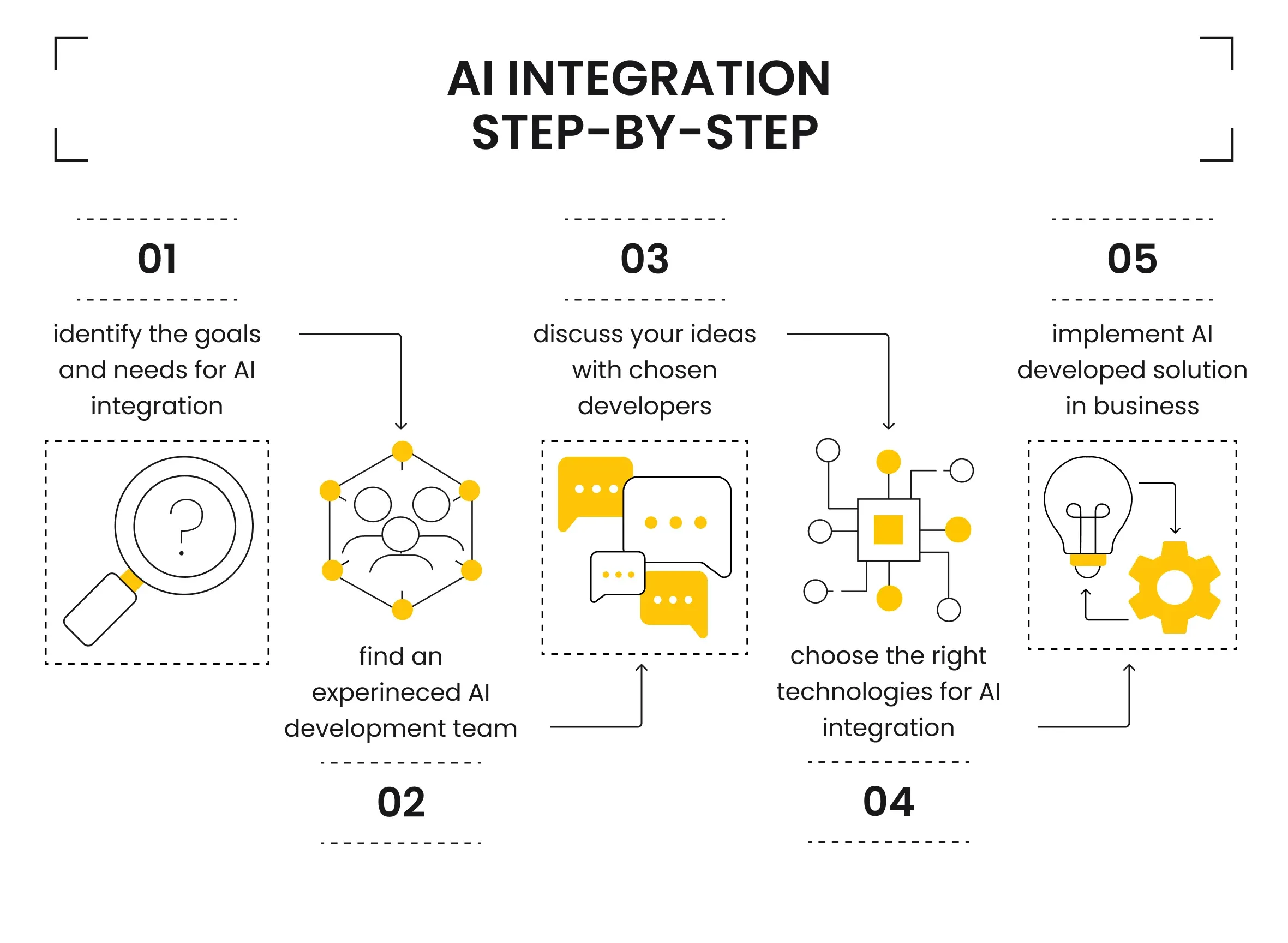
At this stage, you have to participate in the project's discovery phase, set precise tasks, and define what you want to achieve from AI integration in business.
For instance, it can be a conversational AI for customer support services, designed to improve your customer-oriented services.
Or maybe you are looking for AI business process automation that streamlines calculations and data processing, such as AI sales forecasting software.
Simply put, before you implement AI in business, you have to define why and what you are doing it for.
It can be just a general conception, like “I am looking for AI, which can talk to my customers”.
Still, to make it even better, try to theorize and explain in detail.
For illustration, “I am looking for an AI, capable of generating human-like responses to my customers’ questions in under a second”.
In the first case, you can choose whatever chatbot or similar software solution, which eventually can not meet your expectations.
In the second scenario, you and your team will have a clear understanding of what you are looking for, and have at least approximate KPIs, features, and performance metrics:
“Human-like responses” means that you require AI with Natural Language Processing (NLP) capabilities, “In under a second” - it must have excellent performance results, which can be tested
2. Choose Your AI Development Team
The next step in integrating AI into business is to find a team of dedicated developers, familiar with such technologies.
It is preferred to choose a team with proven experience, as shown in case studies on its website.
Despite the variety of artificial intelligence integration options and multiple APIs-as-a-service, it is better to find a team capable of implementing artificial intelligence and customizing it to your needs.
Don’t forget: embedding AI into business processes is a flexible approach. It can be trained or adjusted to meet your expectations and perform tasks even better in the future.
However, to get it right, your developers must have enough experience with these technologies.
One of the best ways to succeed with AI integration in business is to find a dedicated development team.
3. Choose the Right AI Development Tools and Technologies
Finally, before implementing AI in business, you must find the most suitable tech stack.
Integrating AI into business is simple: most AI business solutions are delivered as SaaS and via APIs. So, all you need to do is integrate an API.
Nevertheless, to achieve better results in AI business process automation, it is necessary to tailor it to your needs.
To correctly adjust and set up your AI business automation, you need:
- A niche-experienced software development team on board
- Matching technologies and software solutions, compatible with your artificial intelligence integration, and suitable for desired operations
If you are willing to use AI for Big Data analytics, you should consider Python-based solutions.
Some other purposes require React or other programming languages and frameworks. The best way to choose the right tech stack is to ask your developers for advice.
4. Implement AI in Business
After all the previous steps, you can start AI implementation in business.
Frankly, it is the easiest step, which requires some experience and skills. Yet, after implementing artificial intelligence, don’t forget to adjust it.
Modifying and adjusting the AI implementation in business varies in time and resources, depending on the complexity of desired results and operations that it must perform.
AI Business Solutions with Incora
For a better illustration, let’s consider examples of artificial intelligence in business, developed by Incora.
VoiceOrder.AI: AI-powered Voice Commerce
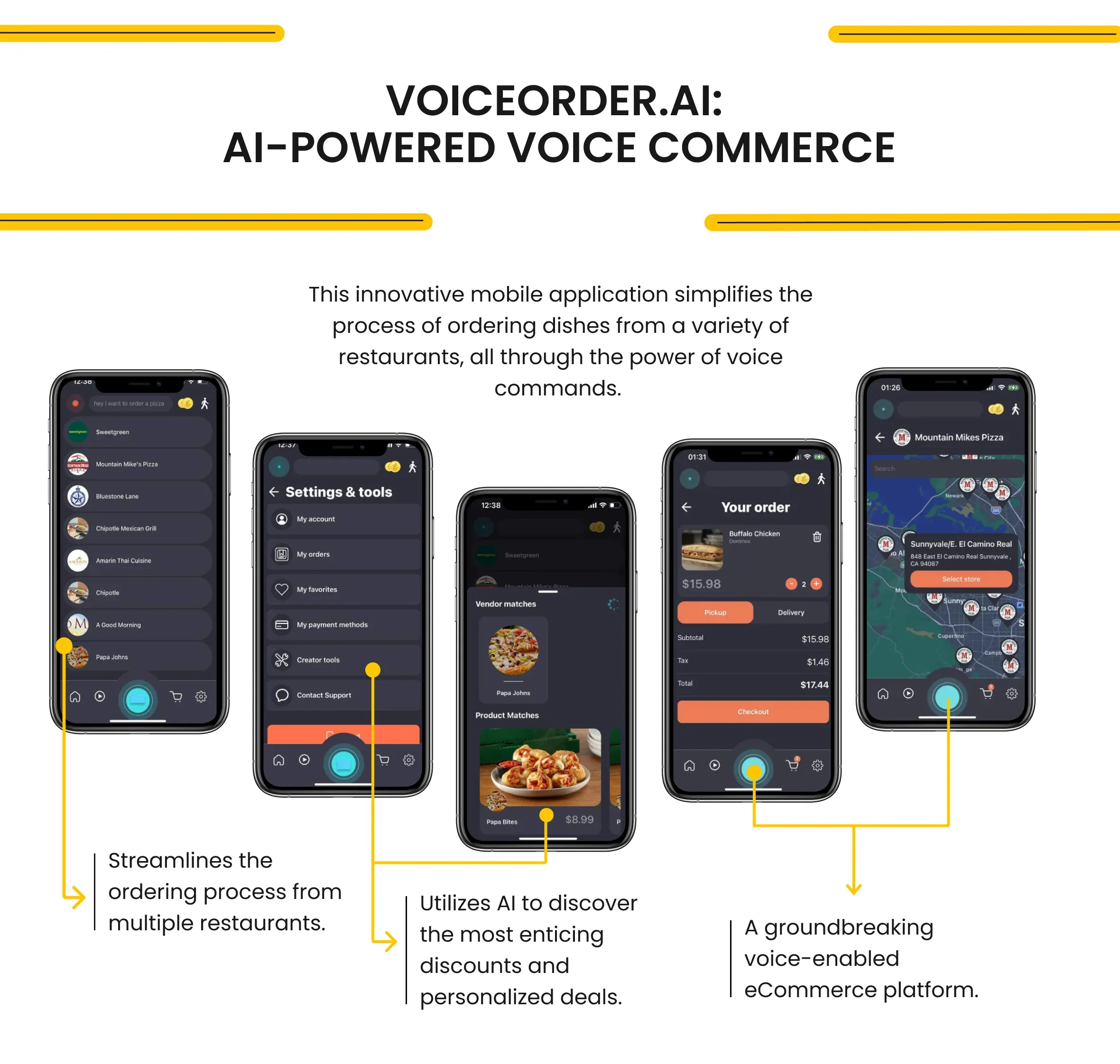
VoiceOrder.ai is one of our recent projects focused on artificial intelligence integrations.
This mobile application is designed to find discounts and other user-oriented deals in various restaurants.
It involves AI-driven algorithms to personalize offers and deals to customers who are willing to order food delivery.
Apart from that, the mobile app uses AI voice technology for user interaction. Built-in artificial intelligence integration can recognize human voice and transcribe it into commands for further action.
As a result, our team leveraged the full potential of AI business automation, which enables multiple AI options simultaneously.
BlackBird.AI: Deep Learning Solution to Combat Misinformation
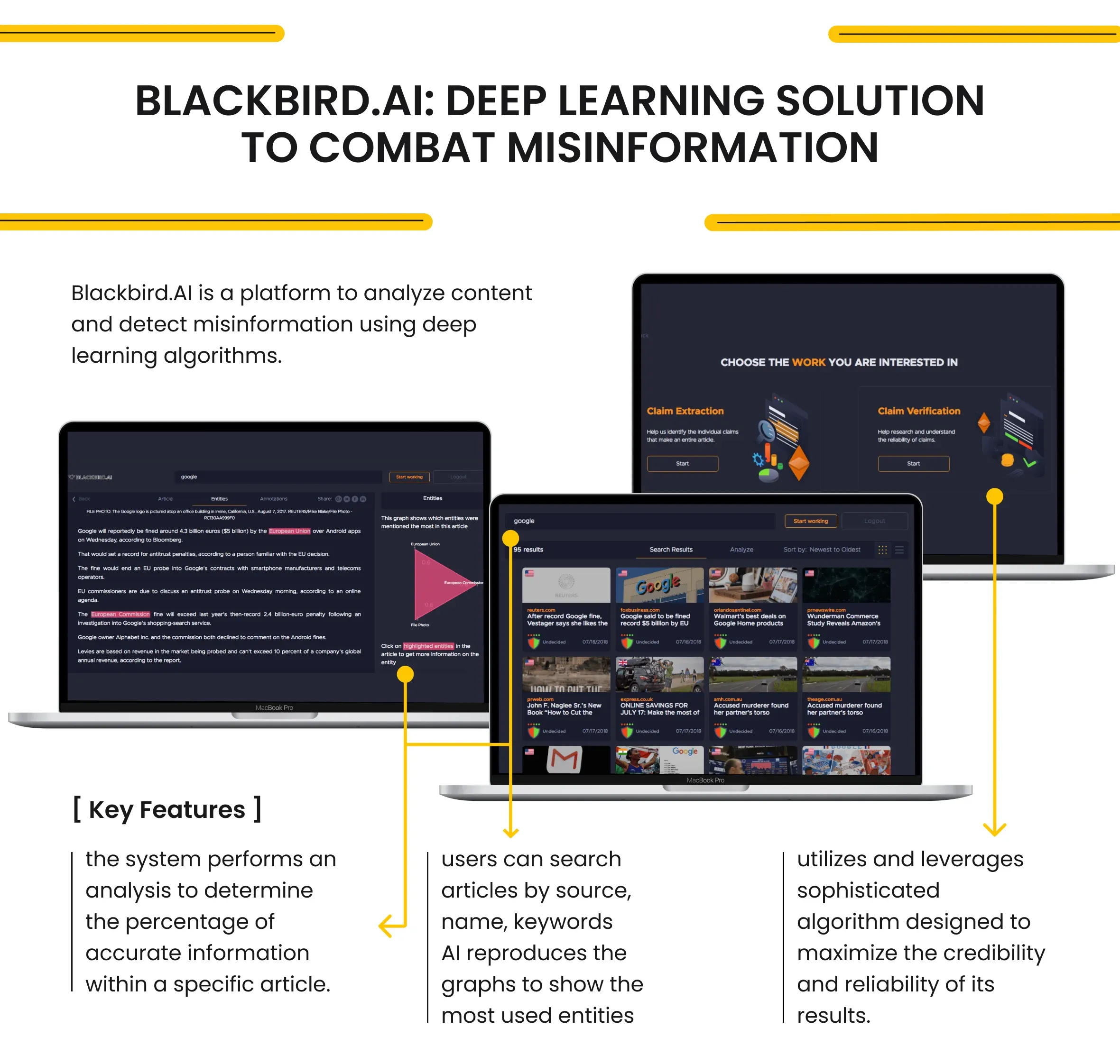
BlackBird.ai is an excellent example of FinTech AI implementation in business.
To cut a long story short, BlackBird.ai is driven by unique, sophisticated algorithms that support risk assessment and fraud detection.
One of the main requirements of this project was the ability to estimate the credibility of data and various articles.
BlackBird users receive credibility ratings and tags such as “unreliable”, “suspect”, “undecided”, etc.
So, they can still see the articles and make their own decision about whether to trust the content.
Therefore, app users are more aware of potential misinformation or fake content, as well as possible mistakes in the text.
Real Estate AI Chatbot for Streamlined Customer Support
Another case involving AI integration in business processes is the development of conversational AI for customer support.
According to Forbes, 73% of businesses use AI chatbots.
So, AI business process automation in specific fields like customer experience and support becomes rather a must-have feature than an extra option at least, if you want to stay competitive in the market.
So, we were involved in embedding AI into business processes related to customer support and satisfaction services.
As a result, integrating artificial intelligence helped upscale service quality and save costs by redirecting customer support specialists to more complex and prioritized tasks.
How to Integrate AI into Business?
Instead of asking yourself “How to integrate AI into an app?”, pay more attention to the importance of artificial intelligence in business, and the potential benefits it can bring.
As we mentioned before, integrating AI into business is not a difficult task nowadays. If you contact us and start cooperating with Incora software, adjusting the AI module to your needs won’t be an issue.
One of the significant challenges of artificial intelligence in business is knowing what you expect it to do and why you need an artificial intelligence integration.
Therefore, instead of worrying about the technical aspects, try to ask yourself: what is artificial intelligence in business, and how can I benefit from it?
When you have your answers - we can embody your ideas to live.
What’s your impression after reading this?
Love it!
1
Valuable
3
Exciting
1
Unsatisfied
1
FAQ
Let us address your doubts and clarify key points from the article for better understanding.
What does AI stand for in business?
In business, AI stands for Artificial Intelligence, which refers to the use of computer systems and algorithms to perform tasks that typically require human intelligence, such as decision-making, data analysis, and customer service automation.
How much does it cost to integrate AI?
The cost to integrate AI can vary widely, ranging from a few thousand dollars for basic applications to millions of dollars for complex, large-scale implementations. Factors influencing the cost include the project's scope, technology requirements, data needs, and development time.
How AI is used in business?
AI is used in business for automating processes, enhancing customer service, improving decision-making, analyzing data, personalizing marketing, optimizing operations, detecting fraud, managing supply chains, predicting trends, and developing new products.
Types of artificial intelligence in business
Types of artificial intelligence in business include machine learning, natural language processing, robotics, computer vision, expert systems, neural networks, deep learning, and chatbots.
Machine learning enables predictive analytics and automation. Natural language processing improves customer interactions through chatbots and virtual assistants. Robotics enhances manufacturing and logistics efficiency.
YOU MAY ALSO LIKE
Let’s talk!
This site uses cookies to improve your user experience. Read our Privacy Policy
Accept

Share this article